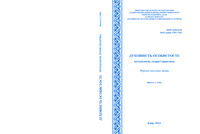SPIRITUALITY OF PERSONALITY IN THE LIGHT OF KNOWLEDGE, RHETORICAL IMAGES OF THE TIME, AND MASTERING ONE’S OWN FUTURE. PART I. EDUCATION – STATE – GOVERNANCE – WORLD OF PROJECTS
DOI:
https://doi.org/10.33216/2220-6310/2023-106-2-168-193Keywords:
spirituality, personality, spirit, education, training, upbringing, meaning, values, virtues, communication, governance, authority, state, activity, time, future, forecasting, project, consultant, analyst, expert, implementer, administrator, self-awareness, language, practical rhetoric, rhetorical «Aristotle's axiomatics», EuropeAbstract
The article is the first of two parts of a new original study devoted to the problem of spirituality in its philosophical, educational, communicative, rhetorical, and governance dimensions. It continues the author’s two-decade-long series of publications on issues of spirituality, education, communicative principles of governance (including project management), and power. It uses material from the author’s lecture course ‘Practical Rhetoric and Communication Management’.
In the Preamble of this first part of the study, the problem of defining the research subject is considered, where a thing being placed in a knowledgeful relationship, or meaningfully correlated with itself, is identified in its idea as a true symbol of itself.
In Chapter I, the definitions of spirituality are proposed as the enlightenment of the human personality by the Holy Spirit, therefore, the enlightened self-awareness, education - as the self-identification of the individual in its authenticity (= commensurability) through knowledge, therefore, the personal communication regarding life management. The role of the secular state in ensuring the right to education and public administration as a model for educating a spiritually mature personality is clarified.
Chapter II presents the author's concept of Aristotle's rhetorical «axiomatics», supplemented by the axiomatics of time distribution in the field of probabilistic knowledge, project activity – as an activity related to mastering the future, agents of project activity and project speech. The types of project forecasting are defined, the project – as a probable knowledgeful scheme of the future, governance – as a powerful communication regarding personal mastery of the future, and authority – as the realization of the right to administration.
In the Epilogue, the preliminary results of the first part of the study are summarized.

